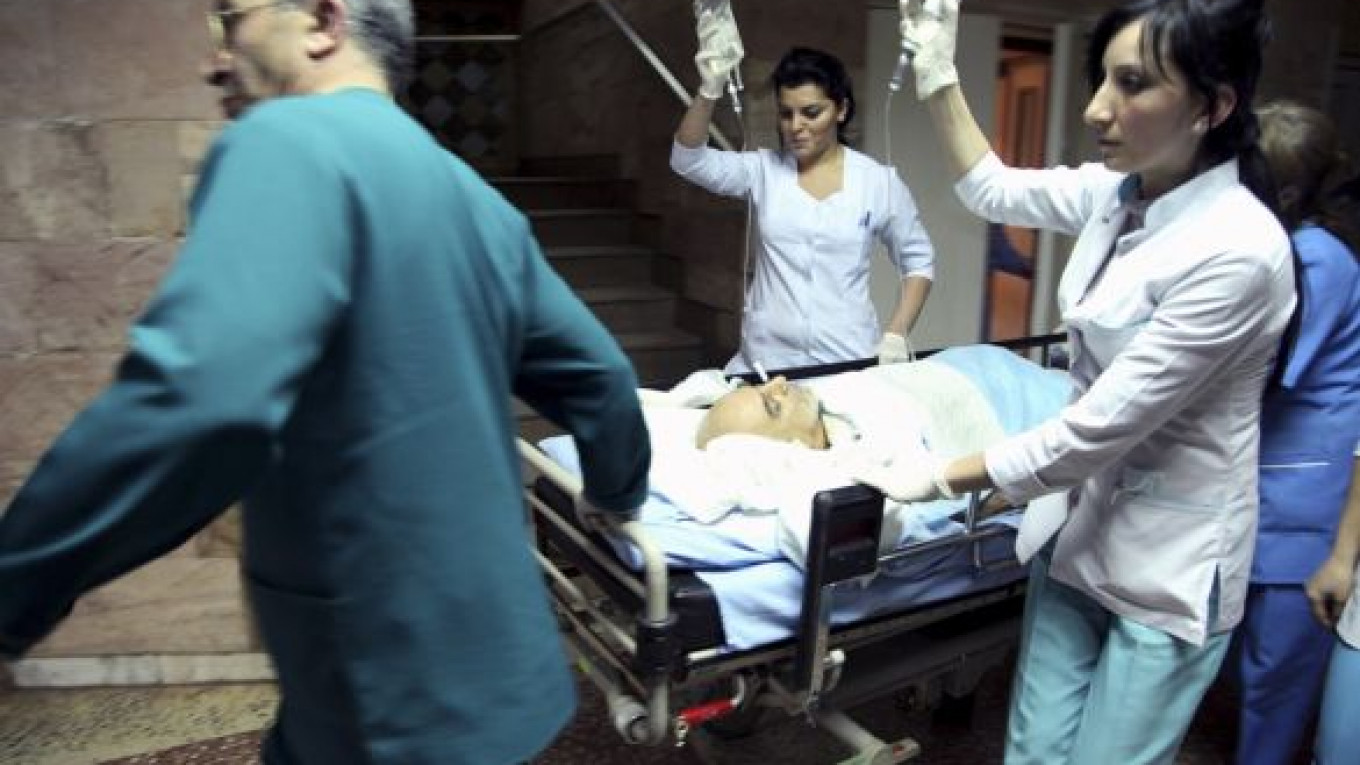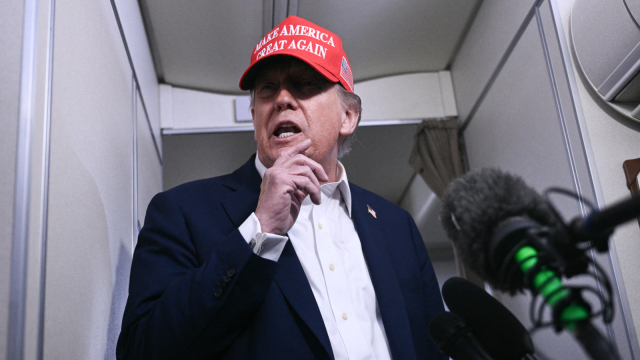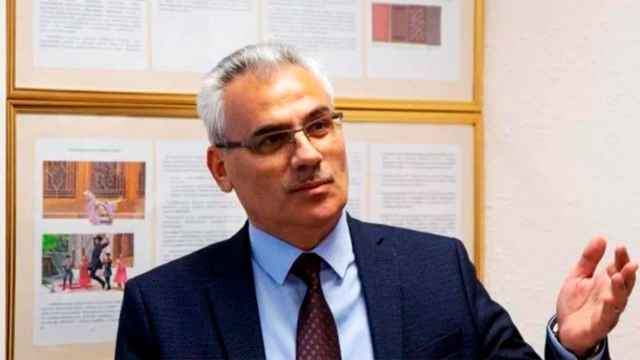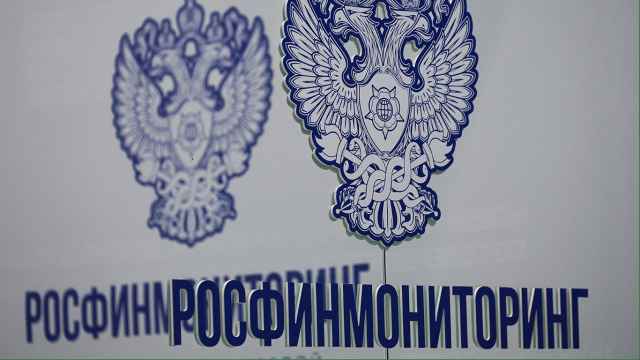YEREVAN, Armenia — An assassination attempt on a presidential candidate has thrown this month’s election into doubt and could threaten stability in the volatile Caucasus region, which carries oil and natural gas to Europe.
Paruyr Hayrikyan, an outsider in the Feb. 18 presidential vote, was shot in the shoulder on Thursday night close to his home in the capital, Yerevan. Doctors removed the bullet Friday and said his life was not in danger.
Hayrikyan, one of eight candidates in the presidential race, said from the hospital after surgery Friday that he would initiate proceedings as allowed by the constitution to delay the vote for 15 days due to his condition, but not longer.
The motive was not immediately clear. In the election, incumbent President Serzh Sargsyan is widely expected to secure a second five-year term.
“It’s obvious that those who were behind this crime aimed to affect the natural flow of elections. This outrageous crime is directed not only against presidential candidate and statesman Hayrikyan but against our security,” Sargsyan told reporters after visiting Hayrikyan at the hospital. “I want to assure everyone that our law enforcement agencies will do their best to solve this crime.”
Stability is vital for the former Soviet republic of 3.2 million to woo investors and boost an economy devastated by a war with neighboring Azerbaijan in the 1990s and then by the 2008-09 global financial crisis.
The attack will raise fears of a return to the violence that left about 10 people dead during the 2008 presidential election in the landlocked country, Russia’s main ally in the turbulent South Caucasus.
“I don’t think that this shot was at Mr. Hayrikyan,” said independent political analyst Alexander Iskanderyan, describing the ex-dissident as a symbol of independence. “This shot was aimed at the political development of the country and was meant to destabilize the situation and mar the election.”
A few hours after undergoing surgery, Hayrikyan said he suspected that a foreign secret service, perhaps Russian, was behind the attack. He recently made statements about Armenia’s need to take a pro-Western course.
“I suspect a secret service of a foreign country. … I said clearly that there was no alternative for us and that we should move closer to Europe,” Hayrikyan told reporters at the hospital. “We’ve had more harm than advantage from imperialistic Russia. … I suggest that the assassination attempt is linked to these statements.”
Any sign of instability in the Caucasus is a concern to investors because although Armenia has no pipelines of its own, pipelines carry oil and gas to Europe via Turkey through Azerbaijan, which still has fractious relations with Armenia.
Russia has a military base in Armenia, which is a member of a Moscow-dominated security alliance of former Soviet states. Investors are already worried that violence could break out again over Nagorno-Karabakh, a mountainous enclave inside Azerbaijan that is controlled by ethnic Armenians. A war in the enclave in the early 1990s killed 30,000 people.
Relations with another neighbor, Turkey, are also fraught because Ankara does not recognize as genocide the killing of Armenians in Ottoman Turkey in World War I. Turkey closed its border with Armenia in solidarity with Turks in Azerbaijan over the Nagorno-Karabakh war.
The Organization for Security and Cooperation in Europe expressed concern over Thursday’s attack.
“This attack is deeply distressing in view of the electoral process already under way, and I urge all stakeholders to refrain from any actions that might further aggravate the situation,” said Ambassador Janez Lenarcic, director of the OSCE Office for Democratic Institutions and Human Rights.
Hayrikyan, 63, is a Soviet-era dissident who survived Soviet prison and internal exile as well as forced deportation from the U.S.S.R. to Ethiopia and the U.S. He leads a moderate opposition party, the National Self-Determination Union, and ran for president in 2003.
Analysts were puzzled about the motive for the attack. “I see the shooting as both a surprise and not necessarily politically motivated. … It may be the act of a frustrated, disgruntled lone individual,” said Richard Giragosyan, director of the Regional Studies Center think tank. “And the key question — who gains from this act — remains unclear. … But it may also reveal the level of discontent lingering just below the surface.”
Armenia was isolated and in chaos after the collapse of the Soviet Union in 1991, and things got so bad in the 1990s that people cut down all the trees in Yerevan to use as firewood.
Matters have improved since then, but the 2008-09 global economic crisis set back the recovery, and the average nominal monthly salary is still under $300.
Related articles:
A Message from The Moscow Times:
Dear readers,
We are facing unprecedented challenges. Russia's Prosecutor General's Office has designated The Moscow Times as an "undesirable" organization, criminalizing our work and putting our staff at risk of prosecution. This follows our earlier unjust labeling as a "foreign agent."
These actions are direct attempts to silence independent journalism in Russia. The authorities claim our work "discredits the decisions of the Russian leadership." We see things differently: we strive to provide accurate, unbiased reporting on Russia.
We, the journalists of The Moscow Times, refuse to be silenced. But to continue our work, we need your help.
Your support, no matter how small, makes a world of difference. If you can, please support us monthly starting from just $2. It's quick to set up, and every contribution makes a significant impact.
By supporting The Moscow Times, you're defending open, independent journalism in the face of repression. Thank you for standing with us.
Remind me later.






